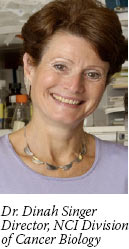
Guest Update by Dr. Dinah Singer
Breast Premalignancy Research Bolstered by Database on Healthy Tissue
 Developing a better understanding of the healthy breast is critical to our efforts to identify biomarkers and other diagnostic and therapeutic tools for use against early breast cancer. At last week's steering committee meeting of the NCI Breast Cancer Stamp Premalignancy Research Program, we heard about a new program that addresses the key issue of our limited understanding of the biology and normal developmental genetics of the mammary gland.
Developing a better understanding of the healthy breast is critical to our efforts to identify biomarkers and other diagnostic and therapeutic tools for use against early breast cancer. At last week's steering committee meeting of the NCI Breast Cancer Stamp Premalignancy Research Program, we heard about a new program that addresses the key issue of our limited understanding of the biology and normal developmental genetics of the mammary gland.
The "Friends for Life" project is an effort of the Indiana University (IU) Breast Program, the Catherine Peachey Fund, Inc., and the IU Cancer Center to create a collection of voluntarily donated breast tissue, blood, and macromolecules derived from blood and saliva of healthy donors. The undertaking is a collaboration among consumer advocates, clinicians, basic scientists, and volunteers. "Friends for Life" was created in response to a need articulated by scientists carrying out breast cancer research - in order to better understand what is abnormal in breast cancer, the breast's normal state needs to be more clearly defined.
A partnership of patient advocates and clinicians eagerly accepted the challenge of developing a bank of normal tissue. The response of the community to the request for volunteers has been overwhelmingly enthusiastic. The tissue bank is currently the repository of more than 2,500 specimens collected over a 2-year period, including specimens from women participating in the annual Susan G. Komen "Race for the Cure" in Indianapolis. All specimens are annotated with detailed information about the donor; most are from women without evidence of breast cancer.
Dr. Anna Maria Storniolo, director of the Catherine Peachey Breast Cancer Prevention Program at the IU Cancer Center and the principal investigator on the project, described the three primary components of "Friends for Life:" 1) the blood and tissue collection procedures; 2) the repository of blood, DNA, and frozen human breast tissue which, in the future, will also contain plasma and RNA; and 3) a Web-based database that can be queried with regard to available specimens and the attributes of the specimens' donors.
This online database will be available later this year and will include additional information on the tissue bank, the standard operating procedures used for specimen collection, and instructions on how to request and obtain tissue.
The uses of normal breast tissue are myriad and include, for example, the isolation of RNA for gene microarrays, the inclusion of these tissues on tissue microarrays, and the cataloging of the epigenetic regulation of normal breast tissue. Annotated DNA from this project has already been utilized to identify single nucleotide polymorphisms associated with hot flashes.
The "Friends for Life" project is an important complement to NCI's Breast Cancer Premalignancy Program, which we think may lead to real advances in understanding and intervening in the early biological events associated with breast cancer premalignancy.
|